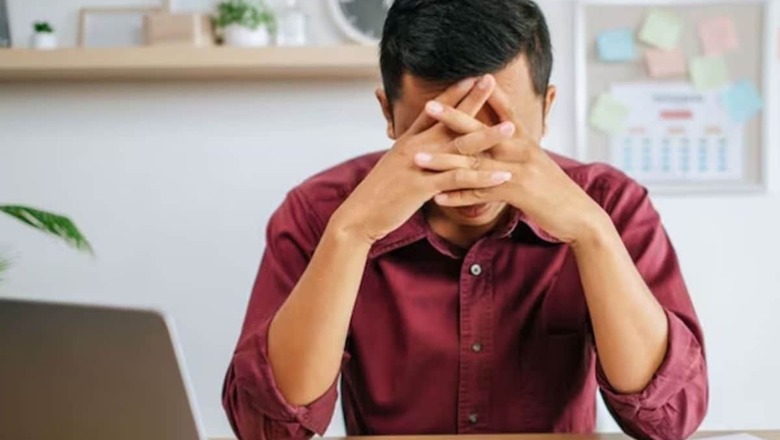
views
In India, male mental health battles a pervasive stigma. The societal expectation of stoicism, coupled with work pressures and limited emotional expression, contributes to a rising concern. Suicide rates among Indian men have surged over one-third in the past seven years, emphasizing a critical need for dialogue. Every seventh Indian man grapples with mental health issues, often exacerbated by anxiety and depression. Breaking these barriers is essential, necessitating open discussions, awareness campaigns, and supportive environments to ensure that men feel empowered to seek help for their mental well-being.
Dr Pritisha Saxena, Consultant Psychiatrist, Vijaya Clinics, Centre for Skin & Mental health, Nagpur, says, “In India, male mental health remains shrouded in stigma, societal expectations, stigma, work pressure, and limited emotional expression and lack of mental health awareness contribute to mental health challenges in Indian men. Breaking these barriers is crucial for well-being. To dismantle these barriers, WE NEED TO TALK ABOUT IT!”
Cases of death by suicide among Indian men have grown over one-third in the past seven years, claimed a report by The Lancet Regional Health. In 2014, 89,129 men died by suicide as against 42,521 women. The ratio rose to 2.64 times in 2021. Last year, 1,18,979 males died by suicide against 45,026 females. Rate of completed suicide to attempted suicide has always been more in men.
Every 7th Indian man is shaken up by some mental health disorder, be it anxiety, depression according to the Indian Council of Medical Research (ICMR) research. The suicide death rate for men has increased from 18.7% to 23.4%.
“Men reporting erectile dysfunction due to high levels of stress is no surprise anymore. In a cultured society where men have been trained to been always the bread earner, while laws been in favour in women when in come to interpersonal relationships, it is getting worse than ever to be man. Since their childhood, they are taught to become the moral, financial, and physical support of the family when they grow up. Our society has always portrayed man as a stronger gender – one who is physically strong, doesn’t cry and is emotionally stronger. This myth not only makes men weaker but also pressurizes them to succumb to live up to the ideals of society,” adds Dr Saxena.
Depression alone affected 45.7 million people while Anxiety disorders affected 44.9 million people. Now, when it comes to mental health for men, the situation gets even more worst as men’s mental health issues are mostly undocumented and unreported and they rarely seek help considered to their female counterparts, who can find solace in discussing with their dreams and families . Generally, men try to hide their depression with alcohol or drugs. In fact, according to the National Mental Health Survey 2015-16, the prevalence of alcohol use disorders in males was 9% as against 0.5% in females. And the overall prevalence of mental morbidity was higher among males (13.9%) than among females (7.5%).
Few signs of depression in men
- Difficulty sleeping or feeling tired.
- Changed appetite — with or without weight loss or gain.
- Feeling run down or unwell.
- Loss of sexual desire or performance.
- Headaches.
- Muscle pain.
- Churning stomach
- Loss of interest in daily activities
- Unable to focus or concentrate
Dr Samir Kumar Praharaj, MD, DPM, Professor & Head, Dept. of Psychiatry, Kasturba Medical College, Manipal, Mahe shares ways to break the sitgma:
- While depression is commonly associated with women, it is not uncommon in men. There is a common misconception that men, perceived as strong, cannot experience depression, which is incorrect.
- Individuals with a genetic predisposition for depression may experience it when confronted with adversity.
- While more women attempt suicide, a higher number of men have completed suicide.
- Men experiencing depression may exhibit anger and irritability, whereas women more commonly express sadness. Many men may not openly admit to feeling depressed, but it can manifest through increased work, substance use, aggression, avoidance of family and responsibilities, and engagement in risk-taking behaviours.
- Men are less likely to talk about depression and seek help as compared to women. Men may find it more comfortable reporting physical symptoms than expressing feelings of sadness.
5 ways you can offer a support
Dr Praharaj shares ways to offer support
- The treatment involves reaching an accurate diagnosis by excluding other conditions like bipolar disorder, personality disorders, and medical causes, including substance use, that can contribute to depression
- Medications and psychotherapy are the current treatment options for the treatment of depression
- The presence of suicidal ideation is an indication for treatment, which may include electroconvulsive therapy or intravenous ketamine infusion for rapid symptom control
- Another alternative treatment involves using transcranial magnetic stimulation to modify underlying brain circuits, effectively controlling symptoms with minimal adverse effects




















Comments
0 comment